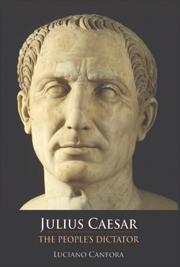Book contents
- Frontmatter
- Contents
- Translators' Note
- Acknowledgements
- Foreword
- PART I FROM SULLA TO CATILINE
- PART II FROM THE TRIUMVIRATE TO THE CONQUEST OF GAUL
- 9 The ‘Three-Headed Monster’
- 10 The Consequences of the Triumvirate: The View of Asinius Pollio
- 11 The First Consulship (59 BC)
- 12 An Inconvenient Ally: Clodius
- 13 Semiramis in Gaul
- 14 The Conquest of Gaul (58–51 BC)
- 15 The Black Book of the Gallic Campaign
- PART III THE LONG CIVIL WAR
- PART IV FROM THE CONSPIRACY TO THE TRIUMPH OF CAESARISM
- Chronology
- Bibliography
- Index
14 - The Conquest of Gaul (58–51 BC)
from PART II - FROM THE TRIUMVIRATE TO THE CONQUEST OF GAUL
Published online by Cambridge University Press: 05 August 2013
- Frontmatter
- Contents
- Translators' Note
- Acknowledgements
- Foreword
- PART I FROM SULLA TO CATILINE
- PART II FROM THE TRIUMVIRATE TO THE CONQUEST OF GAUL
- 9 The ‘Three-Headed Monster’
- 10 The Consequences of the Triumvirate: The View of Asinius Pollio
- 11 The First Consulship (59 BC)
- 12 An Inconvenient Ally: Clodius
- 13 Semiramis in Gaul
- 14 The Conquest of Gaul (58–51 BC)
- 15 The Black Book of the Gallic Campaign
- PART III THE LONG CIVIL WAR
- PART IV FROM THE CONSPIRACY TO THE TRIUMPH OF CAESARISM
- Chronology
- Bibliography
- Index
Summary
When he departed for Gaul in the spring of 58 bc, Caesar had a clear idea of the movements of the peoples and their tensions; in particular, the German pressure on Gaul. He conceived a long-term strategic plan using up-to-date ethnographic knowledge to which he himself contributed with his Commentaries. This is but one example of the way he combined scientific study with imperialism.
Just how dangerous the situation in Gaul really was at that time for the neighbouring Roman provinces cannot be determined, since we rely exclusively on Caesar's version of the facts in his Commentaries on the Gallic war, an expertly constructed work in which every statement has been carefully weighed by its author. Many who remembered the Cimbric invasion were conscious of the German threat: fear of a great host of German warriors descending on Cisalpine Gaul or Italy explains the widespread approval of Caesar's campaigns. Varro Atacinus (Bellum Sequanicum) and Catullus (Ode 11) celebrated his exploits in verse, and Cicero, whose brother Quintus was Caesar's legate in Gaul following the conference at Luca, also joined the chorus.
The Gallic campaign was conducted on two levels: Caesar's own favourable assessment of sometimes dubious victories; and the reality of an extremely difficult war with an outcome that was uncertain, given the threat constantly posed by the fiercely independent Celtic tribes. The dichotomy (especially in the first two years, 58–57 bc) shows clearly in the disparity between the political and military position and the reactions in Rome to Caesar's skilled reporting of them.
- Type
- Chapter
- Information
- Julius CaesarThe People's Dictator, pp. 98 - 117Publisher: Edinburgh University PressPrint publication year: 2007



